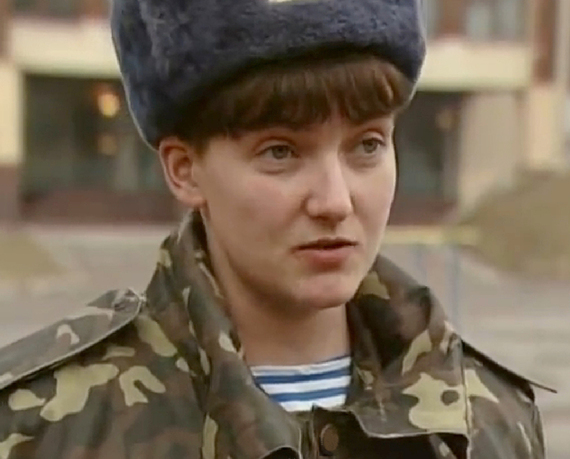Image: Nadia Savchenko (Author: Inter Ukrainian TV Channel Youtube Stream)
When Nadia Savchenko was a girl, her favorite pastime was playing war with the boys in her Kiev neighborhood.
She was so single-minded about the military that it didn't surprise those who knew her when she chose it as a career.
She became a household name in Ukraine -- if not yet a hero -- by becoming the country's first woman fighter pilot and the only woman to serve in its peacekeeping force in Iraq.
An outstanding military career seemed assured.
Then fate stepped in: Separatist forces captured her as she was fighting on the ground against them in eastern Ukraine. They spirited her to Russia, where she was convicted of trumped-up charges of helping mortar crews kill two Russian journalists covering the war.
Her two years in confinement made Savchenko not only a Ukrainian national hero but also a political figure. Ukrainians elected her to Parliament during her confinement as a gesture of defiance against Moscow.
Now that she has been released in a prisoner swap, people inside and outside Ukraine are wondering whether she can become the wise, selfless and dedicated political leader the country so desperately needs.
There have been mixed signs so far.
Savchenko has shown contempt for the political establishment, saying it has long focused on feathering its nest rather than serving the Ukrainian people.
As part of that, she has been downright dismissive of establishment politicians she sees as part of the problem, including President Petro Poroshenko, who worked for her release from captivity, and Yulia Tymoshenko, whose Fatherland Party nominated her for the seat in Parliament that she won.
Savchenko's scorn for the establishment plays well with rank-and-file Ukrainians, who feel betrayed by Poroshenko. The president's ratings are abysmal because of his failure to improve people's lives, to eliminate corruption and to bring a conclusion to the war in the east.
While Ukrainians like Savchenko's anti-establishment stance, if she is to become an effective politician -- to get things done -- she will need to learn to work with others while not compromising her principles. Otherwise, she will be just a symbol.
She can look to the United States to see what happens to war heroes turned politicians. Dwight Eisenhower was an effective leader because he knew how to work with others. Senator John McCain has been ineffective because he's always been a political gadfly and maverick.
Savchenko also needs to learn what issues are important to pursue and what are not.
In recent days she has echoed many right-wingers' belief that Ukrainian should be the only language spoken in the country.
It's a fact of life that many Ukrainians speak Russian, however. And they resent being told what they should speak.
As a national hero, Savchenko is one of the few politicians with the stature to bring Ukrainians together. She will squander that political capital if she pursues symbolic, divisive issues such as language.
No one gets to be a military officer and fighter pilot without being bright and learning to adapt.
Savchenko can become an effective politician without compromising her principles by learning to work with other politicians and by pursuing issues that are paramount.
Whether she uses her stature to become a Dwight Eisenhower -- an effective leader who moves Ukraine forward -- or an irrelevant political gadfly like John McCain depends on whether she can develop political savvy.
One lesson Ukraine has learned from the Savchenko phenomenon is that people want leaders who are not long-standing politicians. That's because most people view political insiders as the epitome of ineptitude and corruption -- the problem rather than the solution.
That's why many Ukrainians have looked favorably on members of the diaspora taking top positions in government. There is a feeling that since they arrived as political outsiders, and came from countries where corruption is minimal, they will serve the public better than long-standing Ukrainian politicians.
Other countries in the former Soviet Union could learn from Ukraine's decision to put members of the diaspora in key positions.
Armenia is a perfect example. It has a large and talented diaspora spread across many countries that could move the country forward while rooting out corruption.
Like diaspora members, Savchenko, as a career military officer, comes untainted to her job as a Ukrainian politician.
Only time will tell whether she becomes the national leader the country is hoping for, or just a political hack whose promise failed to live up to expectations.
Armine Sahakyan is a human rights activist based in Armenia. A columnist with the Kyiv Post and a blogger with The Huffington Post, she writes on human rights and democracy in Russia and the former Soviet Union. Follow her on Twitter at: www.twitter.com/ArmineSahakyann

